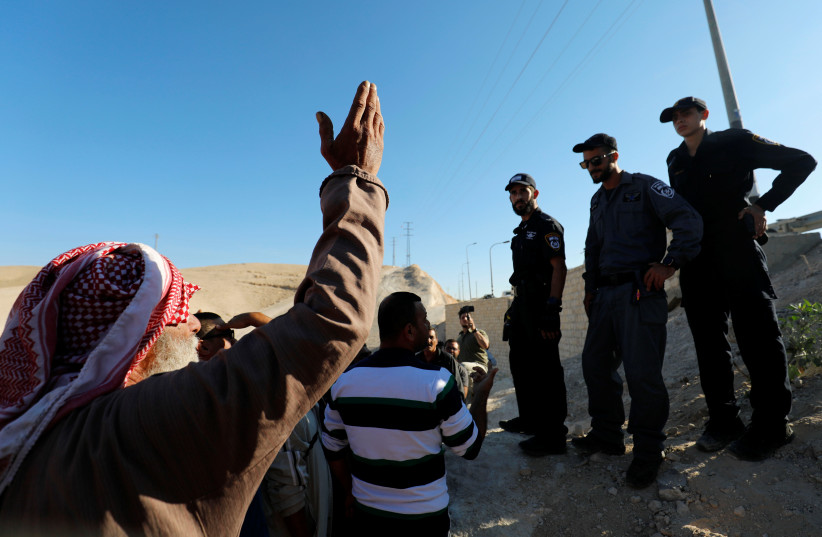Any decision on the fate of the illegal West Bank Bedouin herding village of Khan al-Ahmar must wait until after the elections, Prime Minister Yair Lapid told the High Court of Justice.
His office this week asked the court for an extension until February 1, 2023 to submit any plans regarding the fate of the community of some 180 members of the Abu Dahuk clan of the Jahalin tribe.
Cabinet Secretary Shalom Shlomo submitted the requests in advance of the September 11 date, by which the state had been expected to explain to the court why it had not razed the village’s huts and tents.
Shlomo explained that the collapse of the government, which thrust Lapid into the premiership, made it difficult to submit a response to the court.
He wrote that any new government that forms after the November 1 elections should be given time to formulate an opinion of the affair.

“The abnormality of this request is clear,” Shlomo explained. He referenced the case’s long history and past judicial complaints that the state was dragging its feet on the matter.
There is no dispute, however, that the elected upper political echelon must have the option to present its opinion to the court regarding the fate of the village, he added.
"It is impossible for Lapid and [Defense Minister Benny] Gantz, who speak of promoting the rule of law to disrespect the justice system and the public's trust like this."
Right-wing Israeli NGO Regavim
The right-wing Israeli NGO Regavim has already stated that it plans to object to any delay in a state response, noting that this is the state’s sixth request for a delay since it submitted its petition in 2019.
Last year, the state reported it had made significant progress toward a resolution with Khan al-Ahmar residents, Regavim explained. The court gave it until March to submit an update on the matter and then extended it to July, noting that a time would come when the issue could no longer be pushed off, it added.
In July, the state was given a delay until September and now there is yet another request for a delay, Regavim said.
“It is impossible for Lapid and [Defense Minister Benny] Gantz, who speak of promoting the rule of law, to disrespect the justice system and the public’s trust like this,” Regavim said. “There is no dispute that the illegal outpost deserves to be removed as determined by the High Court, and every delay proves that it is not the rule of law that is important to the government, but the seat. The time has come long ago… to evacuate Khan to Ahmar.”
The NGO had first turned to the High Court on the matter in 2009, in an attempt to force the evacuation of the village.
The 2018 ruling
In 2018, the court ruled that the modular homes in the village could be removed, but did not order the state to do so.
Former prime minister Benjamin Netanyahu had pledged to take down the homes, but then halted any action on the matter after former International Criminal Court chief prosecutor Fatou Bensouda warned that such demolition could be considered a war crime.
The Abu Dahuk clan had initially lived in the Negev, but they were forcibly evacuated by Israel to the West Bank in the early 1950s. They have been located in the area of Khan al-Ahmar since the 1970s.
